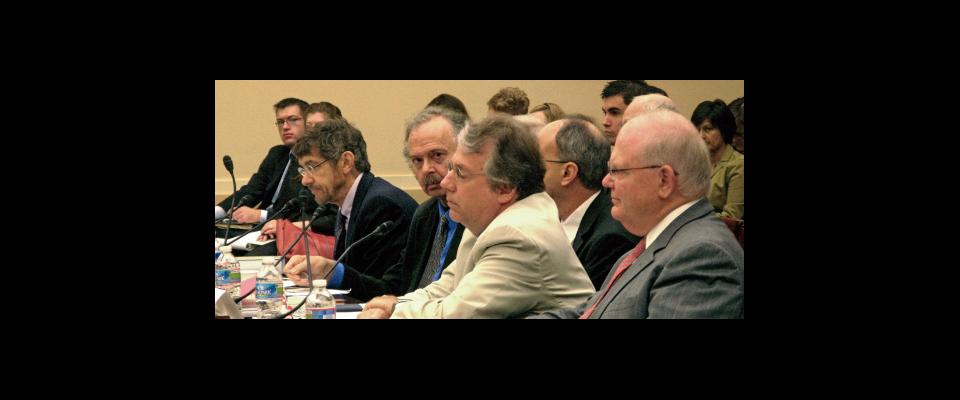After President Donald Trump’s inauguration, information was altered and links up and died on government websites. In response, citizen programmers, scientists and activists met up at UC Berkeley for Data Rescue SF, an event created to preserve publicly accessible data, specifically from NASA Earth Sciences and the Department of Energy National Labs.
In Toronto, New York, and LA, other scientists scrambled to collect and archive other forms of federal information, lest it disappear without warning.
Alarmed at the prospect of losing vital public information, Cal grad and Data Rescue co-organizer Lindsey Dillon believed it imperative to step in. “It’s interesting that a dead link is interesting. Had it been a year ago, you’d find a dead link, and it’d be like, ‘Oh, whatever,’” says Dillion. “But we live in a moment where we’re worried about this Orwellian disappearing of information.”
But are things really so bad that we need to summon Orwell references? Can’t we trust our government to take charge when important federal government information is tampered with? Maybe not. It turns out that the current US legislation around protecting public interest information functions as a sort of pirate code: more what you’d call guidelines than actual rules.
“There are laws that limit agencies from removing information from their site without first giving adequate notice,” says Patrice McDermott, former executive director of OpenTheGovernment.org and author of Who Needs to Know? The State of Public Access to Federal Government Information. “But the ‘adequate notice’ has never been defined. It’s never been interpreted, it has never been litigated, so it’s not clear what that is.”

So, though there’s a gauntlet, no one’s sure where to throw it down.
The legislation that’s supposed to regulate federal information includes the Paperwork Reduction Act of 1995 (PRA), which was created to better monitor federal government information collection and requests, and the Federal Records Act (FRA)—established in 1950 as a way to manage, maintain and properly dispose of government information; this required federal agencies to cooperate with the National Archives and Records Administration (NARA).
“The Federal Records Act makes it an offense to knowingly and arbitrarily destroy government records,” McDermott says. And yet: “No one—NO ONE, period! —has ever been prosecuted for doing it.” Even when the CIA knowingly destroyed videotapes of torture, counter to court orders, says McDermott, the National Archives referred it to the Department of Justice, they put a special prosecutor on it, and nothing has yet come of it. “None of the [statues] really have teeth. And when they’re ostensible teeth, they’re never in force.”
And since the language in the PRA is about agencies rather than individuals, then if someone knowingly destroys government property, “they could be theoretically prosecuted” for either a civil or a criminal offense, says McDermott. “But I’ve never heard of it happening.”
That’s because there are a lot of civil service protections for individuals, especially if they’re part of a union. So if tampering happened, it would be difficult to penalize someone for it.
That’s not to say no one is trying to keep agencies in line.
OpenTheGovernment.org partnered with over 60 organizations to send a letter to the Office of Management and Budget (OMB) delicately urging them to remind federal agencies that they’re supposed to issue public notice before removing online government information.
But, at present, the government has yet to touch the imprecise legislative language, possibly out of self-preservation.
“The Department of Justice, which has a big say in things like the Freedom of Information Act, has resisted a position of penalty,” McDermott says. “Essentially, the government, the executive branch, has a tendency to protect itself against Congress, quite frankly.”
One of the reasons it’s so easy to dance around the legislation is that it’s freaking old. The Federal Records Act was created nearly 70 years ago and the PRA was last updated in 1995, which means the legislation doesn’t factor in that little invention we call the Internet. So even though the web has widely become the primary way of sharing information, it’s actually not against the law to take info off a website, says Michael Halpern, deputy director of the Center for Science and Democracy at the Union of Concerned Scientists.
“We all, in some ways, are easily in a position to and often do, directly or inadvertently, pick the data that favors what we think to be right—and that’s all right if we leave all the data available for someone to assess our argument by.”
When the Environmental Protection Agency (EPA) removed mentions of carbon pollution as a cause of climate change (an act they called “housekeeping” in an agency statement), they were technically within their rights as long as the information wasn’t destroyed and was housed elsewhere for the public to find of their own accord. “In most cases, there’s not anything written into the statute that says the EPA has to make pollution data available online,” Halpern says.
Information has been removed from government websites during other presidential transitions, e.g. Clinton to Bush. After information on the Clinton website was scrubbed, says McDermott, there was a lot of back and forth between the Department of Education before the old content was madƒe available again on a publicly accessible site.
The reason this administration’s data alterations may seem more disconcerting than those of yore is that they seem to want to eradicate all information that may go against their agenda—which would make it nearly impossible for others (say, scientists and activists) to construct arguments that veer away from the party line.
“We all, in some ways, are easily in a position to and often do, directly or inadvertently, pick the data that favors what we think to be right—and that’s all right if we leave all the data available for someone to assess our argument by,” says Paul Duguid, professor at Berkeley ‘s School of Information. But if we only hang onto the data that supports our argument, and ignore or suppress all the data that might question it, then things may become more complex again.”
And missing or selectively available data can create a hole in which crummy regulations can get passed, says Halpern.
“When the administration chooses what data it makes available, it strengthens the hand of those opposed to strong environmental regulation,” Halpern says. “It also strengthens the hand of those who want to pass bad legislation.”
Scott Pruitt, a climate change skeptic who has sued the EPA multiple times to stop them from enforcing environmental regulations, is now the new EPA Administrator. This could mean that while he’s in charge, federally funded environmental and scientific data gathering could be halted—and proposed drastic cuts to agency budgets could prevent scientists from collecting and analyzing information that allows them to further the agency’s mission.
It was difficult to enact environmental regulations even before the EPA was taken over by Pruitt; it takes copious amounts of evidence and years of testing to make a good case for new regulations. So, if Pruitt puts a hold on studies necessary for furthering environmental research and earlier data disappears passage of laws will be even more difficult.
But the removal and tweaking of pre-existing info isn’t the only contribution the Trump administration is making to the US data kerfuffle.
There’s currently a bill in Congress called the HONEST Act, which stands for the “Honest and Open New EPA Science Treatment Act of 2017,” that could actually make government operations more opaque in the name of government transparency, says Halpern. Not only does the act’s title boldly suggest that the EPA was not honest and open before, but if passed, would make it so the EPA can’t propose a new regulation unless they make all data supporting the regulation publicly available.
“It sounds like a good idea. You want all the data to be public so that people can look at it,” Halpern says. “But that also would require [the EPA] to disclose a whole bunch of medical data and information—which they are precluded from doing by other laws, which are good laws,” Halpern says.
“The end result is that [the EPA] can’t regulate at all; it can’t make any new rules to protect the public.”
Considering the jumble of contradictory regulations and unenforceable rules, organizations like Data Refuge and Environmental Data and Governance Initiative (EDGI) are quite possibly our greatest shot at holding onto information that allows us to create policies based on actual evidence rather than the whims of senators or members of Congress.
In addition to working with EDGI and the Data Rescue project, Dillion has done research on Hunter’s Point in San Francisco (known to be ridden with toxic soil). The communities she works with rely heavily on federal data to analyze environmental toxicity. Urban planners are also concerned about the safety of census data, Dillon says, which is necessary for making better urban and city policies for places in desperate need.
“[Data] is essential in understanding what’s going on in the community and mobilizing—making claims for more protection,” Dillon says.
If scientists and activists have a handle on data and can challenge absurd or baseless proposals made by the administration, it could make it less likely that they will continue to propose them, Halpern says.
“The Data Refuge efforts end up being a bit of an insurance policy against what many researchers fear this administration will pursue,” Halpern says. “I think it’s important for us to build that kind of resiliency into the system so that no matter who is in power, there are protections for data and access to that data.”
Data rescue projects also can help educate the public about why federal government collection of information is so essential to our quality of life—a fact not necessarily apparent to all Americans.
Duguid citing the toxic water crisis of Flint, Michigan as an example, points out that people take for granted that tap water is safe to drink, and they do so based on a belief in government, science, and an assumption that public servants will intervene in a crisis.
“Suddenly when the water makes us sick, only then do we become aware how very much we are dependent on this intricate system,” Duguid says. “And as we start to find different mechanisms pecking away at that, it’s going to make life very uncertain for all of us.”
More, between the White House leaking like a sieve and distrust growing between government agencies, “the reliability of every set of data will be brought into question,” says Duguid. “Because the standard channels that we rely on to tell us [information] are disappearing.”
Right now, the scientific community and administration seem to be at odds.
“It’s a war on whether the federal government will be able to continue to provide essential information to public health departments, state environmental planners, geologists, and others who have taken an oath to serve the American people,” Halpern says.
In other words, whether or not scientists can continue gathering information essential to making decisions in a democratic society remains to be seen.





















